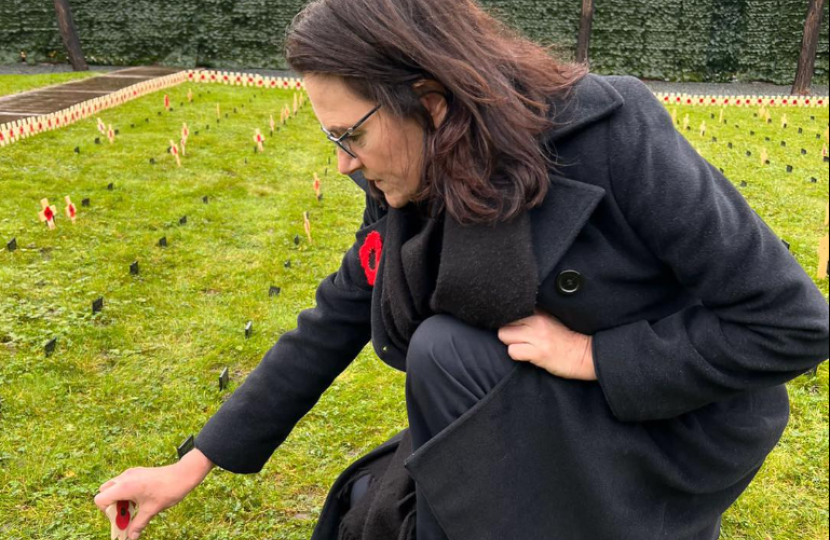
Remembrance Sunday is one of the most important events of the year when we come together to commemorate the British and Commonwealth military and civilian service men and women who have served for their country in the two World Wars and later conflicts. We all know how vital it is that we are able to continue to do so this year.
That is why services of remembrance should go ahead this year but, due to the pandemic, they will need to be adapted to ensure the safety and security of those attending. The COVID alert levels, across all tiers, provide for a specific exception for Remembrance Sunday events for participants and spectators, provided appropriate precautions are undertaken by the event organiser. The Department of Housing, Communities and Local Government has produced advice for Local Authorities and those organising the events, such as the Royal British Legion, that sets out how ceremonies can continue to be held safely. In many cases they will need to be significantly different to usual practice, so the Government would encourage you to read the advice and pass it on to interested constituents. This is available at: https://www.gov.uk/government/publications/local-authority-preparations-for-remembrance-sunday/local-authority-preparations-for-remembrance-sunday.
The COVID arrangement overseen by the devolved administrations may differ, but notwithstanding, Remembrance Sunday is a national event across the United Kingdom to remember the fallen.
Oliver Dowden, the Secretary of State for Digital, Culture, Media and Sport, is overseeing plans for the National Service of Remembrance at the Cenotaph. It is essential that the national event still takes place, but it has been decided that it will be limited to a much smaller outdoor service, with no public attendance. Veterans will be at the heart of this, with those attending on the day playing a full role in the service, including being invited to march past the Cenotaph. The wreath laid on behalf of Her Majesty The Queen is laid on behalf of the whole nation, and is dedicated to all those who have suffered and died in war.
Local Authority Preparations for Remembrance Sunday
This note sets out how Remembrance Sunday activities can take place in line with current COVID-19 restrictions and requirements in England.
As of 14 September, there are new legal requirements which apply to Remembrance Sunday events. Other information contained in this note is based on existing guidance, and has been brought together to aid those organising local activities for Remembrance Sunday.
The COVID alert levels, across all tiers, provide for a specific exception for Remembrance Sunday events for participants and spectators, provided appropriate precautions are undertaken by the event organiser.
It is important to consider other local restrictions which may apply in your area, when planning events. You can find out whether additional measures apply in your area at: https://www.gov.uk/guidance/local-covid-alert-levels-what-you-need-to-know?priority-taxon=774cee22-d896-44c1-a611-e3109cce8eae.
Who can organise a Remembrance Sunday event?
Local Authorities in England can organise outdoor Remembrance Sunday events at a public war memorial or cenotaph, if you complete a COVID-19 risk assessment and take all reasonable measures to limit the risk of transmission of the virus. You must also take into account the national guidance on outdoor events (https://www.gov.uk/government/publications/coronavirus-covid-19-guidance-on-phased-return-of-sport-and-recreation/guidance-for-providers-of-outdoor-facilities-on-the-phased-return-of-sport-and-recreation), including all cleaning and hygiene precautions.
Where necessary, you should engage with neighbouring businesses, transport operators and Local Transport Authorities to assess any risks to the local area of increased visitors from other locations and apply additional mitigations if needed.
What can a Remembrance Sunday event involve?
The Remembrance Sunday event at the National Cenotaph will be adjusted this year to ensure the event is as safe as possible. Local events should be adapted to reflect the same principles. They should:
- short and focussed on wreath laying, with a reduced march past or parade only if social distancing can be maintained
- take advantage of opportunities for wreath layers to represent wider groups
- take precautionary measures as set out in the performing arts guidance (https://www.gov.uk/guidance/working-safely-during-coronavirus-covid-19/performing-arts) for any small, military bands
- not involve communal singing
- keep numbers to a minimum, focussing attendance on those wishing to lay wreaths (more information on who can attend below)
- take reasonable steps to minimise wider public viewing, encouraging the public to observe the rule of 6 when spectating
- observe social distancing at all times
Who can attend a Remembrance Sunday event?
Event organisers should keep numbers to a minimum. For the avoidance of doubt, the following people are legally permitted to attend events to commemorate Remembrance Sunday as participants. Attendees should observe social distancing at all times.
- people attending as part of their work (such as local councillors, local faith leaders, the local MP)
- people attending in a voluntary capacity on behalf of a recognised organisation
- members of the armed forces
- veterans of the armed forces, and/or their representatives or carers
Members of the public are legally permitted to stop and watch the event as spectators, but must observe the rule of 6 and social distancing rules. Event organisers should take reasonable steps to ensure the public attend alone, or do not mix in groups larger than 6 when in an outdoor public space (unless they are from one household/support bubble).
The guidance on shielding and protecting the most seriously clinically vulnerable (https://www.gov.uk/government/publications/guidance-on-shielding-and-protecting-extremely-vulnerable-persons-from-covid-19/guidance-on-shielding-and-protecting-extremely-vulnerable-persons-from-covid-19) has recently changed, please ensure you take this into account when planning events.
Test and Trace
Event organisers must take reasonable steps to record the contact details of those attending (including those present in a working capacity, and members of the public who stop to spectate).
Event organisers must keep a temporary record of attendees for 21 days, in a way that is manageable, and assist NHS Test and Trace with requests for that data if needed. This could help contain clusters or outbreaks. Further detail can be found in the current Test and Trace guidance at: https://www.gov.uk/guidance/nhs-test-and-trace-how-it-works.
Those responsible for organising events, and businesses working on an event site, must also keep records of staff working patterns for a period of 21 days.
Many organisations already have systems for recording their attendees. You can find details of how to maintain records at: https://www.gov.uk/guidance/maintaining-records-of-staff-customers-and-visitors-to-support-nhs-test-and-trace.
There is also an NHS App which can be used to log in attendees.
It should be noted that those found not to be compliant with these regulations may be subject to financial penalties.
Please note the legal requirement on recording contact details does not extend to Places of Worship, however it is strongly advised that recording is put in place where possible.
Communal Worship
Remembrance Sunday services are traditionally part of communal worship. Places of worship remain open for communal worship services for as many people as can be safely accommodated.
Whilst engaging in an activity in the place of worship or surrounding grounds, all parties should adhere to social distancing guidelines at all times, even within a group of 6. This means people should be 2 metres apart or more than 1 metre apart as well as taking extra steps to stay safe (such as wearing face coverings) to reduce the risk of transmission.
It is important that risks are managed sensibly and in line with wider Places of worship guidance (https://www.gov.uk/government/publications/covid-19-guidance-for-the-safe-use-of-places-of-worship-during-the-pandemic-from-4-july), and that services conform with the COVID Local Alert Level restrictions (https://www.gov.uk/guidance/local-covid-alert-levels-what-you-need-to-know).
